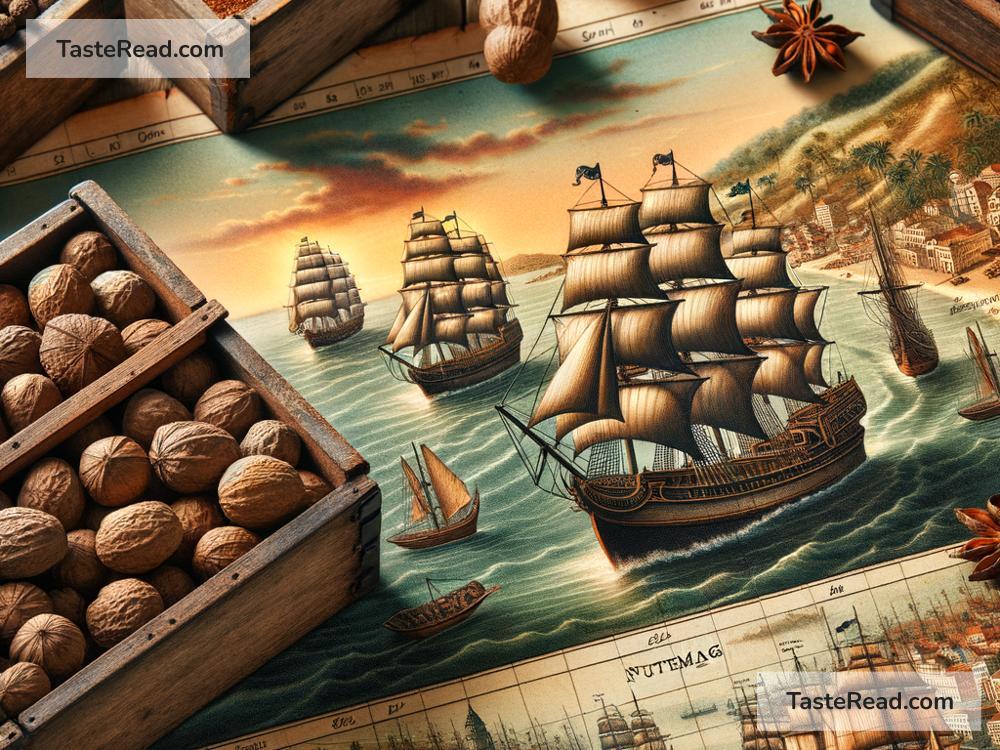The Historical Significance of Nutmeg in Colonial Trade Routes
Nutmeg, a spice often found in kitchens today, has a fascinating history. Once considered more precious than gold, this small, aromatic seed shaped world trade, sparked conflicts, and influenced global economies during the colonial era. How did something so small become so important? Let’s dive into the historical story of nutmeg.
What Is Nutmeg?
Nutmeg is the seed of the nutmeg tree, scientifically known as Myristica fragrans. The tree grows in tropical climates and is highly valued for its fragrant seeds. Nutmeg is used in cooking to flavor food, and in historical times, it was also believed to have medicinal properties. It even became famous for its supposed ability to ward off the plague—a deadly disease that terrorized Europe.
The Origins of Nutmeg
Nutmeg is native to a small group of islands in Indonesia called the Banda Islands, part of the Maluku Islands, also known as the Spice Islands. These islands were the only places where nutmeg trees naturally grew. For centuries, the people of the Banda Islands harvested nutmeg and traded it with neighboring regions.
Because nutmeg was a rare spice and could only be found in these remote islands, it became extremely valuable in international trade. Travelers and merchants went to great lengths to obtain it, bringing nutmeg from the Spice Islands to places like India, the Middle East, and eventually Europe.
Nutmeg’s Rise in Europe
Nutmeg first arrived in Europe during the Middle Ages—around the 10th century—thanks to Arab traders. Europeans were fascinated by nutmeg. It added flavor to food, masked unpleasant smells, and was believed to have health benefits. At a time when there were no refrigerators, nutmeg was especially valuable because it helped preserve food while adding flavor.
By the 15th century, demand for nutmeg skyrocketed. European nations like Portugal, Spain, and later the Dutch and English became heavily invested in finding ways to control its trade. This wasn’t just about spices; it was also about power and money. Whoever controlled nutmeg trade controlled enormous wealth.
The Age of Exploration and the Competition for Nutmeg
The search for nutmeg played a big role in the Age of Exploration—a period when European countries sent ships on long voyages to explore the world. Portugal was the first country to establish trade routes to the Spice Islands in the early 16th century. They earned huge profits by selling nutmeg to European markets, but their monopoly didn’t last long.
In the next century, the Dutch and the English wanted their share of the nutmeg market. Their rivalry for control over the Banda Islands escalated to battles and wars. The Dutch eventually gained dominance and brutally suppressed the Banda Island inhabitants to maintain control. In 1621, the Dutch carried out a violent conquest over the local population, allowing them to take over nutmeg production completely. Sadly, this dark chapter in history highlights how the race for nutmeg led to exploitation and suffering.
Nutmeg’s Economic Influence
The Dutch took extreme measures to ensure their monopoly over nutmeg trade. They established strict control over planting nutmeg trees, ensuring they could only grow in the Banda Islands. To further corner the market, they coated nutmeg seeds in lime to prevent them from germinating if smuggled elsewhere.
At the peak of the nutmeg trade, the spice was incredibly expensive in Europe. One pound of nutmeg could cost the equivalent of several weeks’ wages for a laborer. Nutmeg became a symbol of prestige, and wealthy families coveted it for their homes.
Nutmeg and the Global Trade Network
The nutmeg trade also contributed to the rise of global trade networks. Ships carried spices between Asia, Europe, and the Americas, helping to connect different parts of the world. Merchants traded nutmeg alongside other spices like cinnamon, cloves, and black pepper, forming an important part of the early global economy.
Nutmeg’s influence extended to the Americas as well. The spice reached the Caribbean through colonial trade routes, where it became an ingredient in local cuisines. Nutmeg was also traded for goods like sugar, rum, and tobacco, further tying it into the global economy.
The Treaty of Breda and the Nutmeg Trade
One of the most surprising stories in nutmeg’s history comes from the Treaty of Breda in 1667. After years of conflict, the Dutch and the English signed the treaty. As part of the agreement, the Netherlands kept control of the Banda Islands and their nutmeg trade, while England took over the relatively unknown island of Manhattan—now home to New York City. This exchange shows how valuable nutmeg was at the time—so valuable that an entire city was traded for it!
Nutmeg’s Legacy Today
Today, nutmeg is no longer worth its weight in gold, but it remains a popular ingredient in cooking around the world. It’s found in baked goods, beverages, spice blends, and traditional dishes. Nutmeg’s history reminds us of the lengths people went to for spices and how those pursuits shaped the modern world.
From its humble beginnings in the Banda Islands to its role in colonial trade and global conflicts, nutmeg has left an undeniable mark on history. The next time you sprinkle some nutmeg on your holiday dessert or sip a cup of spiced coffee, take a moment to think about this little seed’s remarkable journey through time. It’s a story of exploration, exploitation, and transformation—a spice that truly changed the world.


